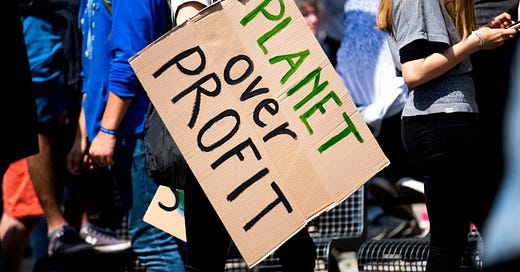For Ontario Voters: Ecological Issues in Ontario
This is a special edition of my newsletter for Ontario voters (and anyone else interested in the Feb 27 provincial election)
Yesterday I was part of a panel discussion called Election 2025: More Than Tariffs. I was invited to speak on ecological issues in Ontario to inform voters as they prepare to make their mark this Thursday, February 27.
We are in a climate and ecological crisis, and it’s all hands on deck... Subscribe to join a community of people of faith who care about climate action and find hope and encouragement at the same time!
If you missed the discussion, here is the text of my presentation. Please share widely with your Ontario friends and family!
Election 2025: Ecological Issues in Ontario
As you all know, we are in an ecological crisis that is threatening all of life on Earth. It is a triple planetary crisis of climate change, biodiversity loss, and pollution. Of these, climate change now drives not only every aspect of the ecological crisis but every single aspect of society.
As voters, we have a responsibility to consider how the ecological crisis is impacting people and the planet in our province and what we need from our elected leaders. More importantly, as Christians, we are called to take climate action as part of our discipleship. Discipleship is how we live our faith out in the world, and so how we vote on February 27 and continue to hold our elected officials accountable after that date is part of our discipleship.
How we vote on February 27 and continue to hold our elected officials accountable after that date is part of our discipleship.
Let us look at a few key ecological issues facing us in Ontario right now.
The first issue is about energy. We need to move entirely away from burning fossil fuels in this province. Renewable energy is becoming rapidly less expensive to build, and at times, Ontario has put resources into plans for renewable energy, and supporting individuals in buying electric vehicles, installing heat pumps, solar panels, and more. However, it has continued to insist that natural gas needs to be part of the equation for our energy needs.
Natural gas has been falsely marketed as part of the solution to climate change. The term ‘natural gas’ is a misnomer; it is primarily composed of methane, which is far more dangerous in the atmosphere in the shorter term than CO2. Methane is 80 times more potent than carbon dioxide over 20 years. Thus, we must stop burning natural gas now. Despite this reality, Ontario has cancelled hundreds of renewable power projects, and new gas plants are currently being planned. We need to consider what leadership will move us away from natural gas and support us in switching to renewable forms of energy.
The second issue I want to discuss is that of Ontario’s Greenbelt. The current government is determined to build Highway 413 through the Greenbelt, despite failing to complete an environmental assessment, consult with First Nations communities, or take into account the threat to several endangered species in the area. Bill 212 which allows for this highway also removes bike lanes in Toronto, restricting residents’ safe access to a clean and healthy form of transportation.
If you’re not from Toronto, you might wonder how this issue is relevant to you. The fact is that the issue of building a highway through the Greenbelt and restricting bike lanes in Canada’s largest city has implications for all of us. The increase in carbon emissions – from building the highway, and from the increased traffic it will generate – heats up the atmosphere everywhere. And this kind of disregard for First Nations’ rights and the desire to prioritize economic over ecological and community interests impacts all of us. We need to consider leadership that will include First Nations and local communities in decision-making, reduce our dependence on cars, and make every effort to protect endangered species.
The final issue that I want to address is Ontario’s wetlands. Wetlands are a vital part of ecosystems, providing habitat for wildlife, water purification, and protection from floods. Wetlands serve as carbon sinks, removing carbon from the atmosphere. Many of the wetlands in our province are very sensitive natural areas but are increasingly under threat. They are being developed for housing, causing urban sprawl, increasing our vulnerability to damaging floods, and threatening diverse species that call them home.
Programs and policies designed to protect our wetlands have been dismantled over the years, and the powers of oversight bodies have been cut. We need leaders who will restore the powers of these agencies, and build robust programs to protect our wetlands.
As Christians, it is our duty to take climate and ecological action as part of our discipleship. Part of that action needs to happen on February 27; more needs to happen after the election, no matter who is in power. It is our responsibility to advocate for policies and programs that rapidly move us away from fossil fuels, limit biodiversity loss, and reduce pollution.
As you consider the issues before us, I invite you to take the following questions into your prayers:
“God, what are you calling me to in light of the climate crisis and this election? What is your will for me?”
Then, I invite you to ask God to give you the strength and courage to respond. Thank you very much.










Jessica - excellent points! Thank you for your contribution to our panel discussion yesterday on Election 2025 - More than Tariffs. All of the issues discussed (Health care, Harm Reduction, Housing and Income Security) are interrelated. (AND YES, there ARE more issues - Education +) It was inspiring to hear and TO ACT.